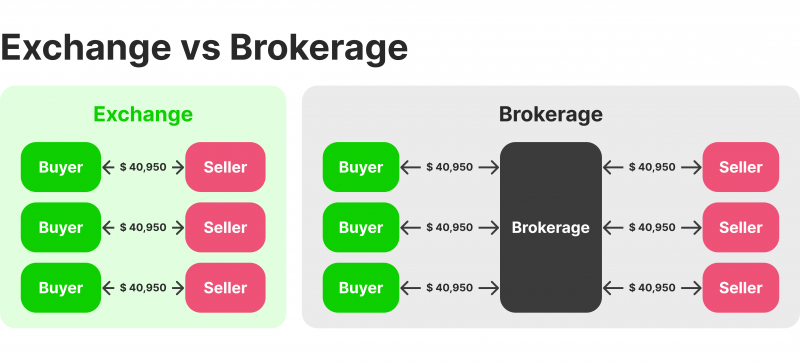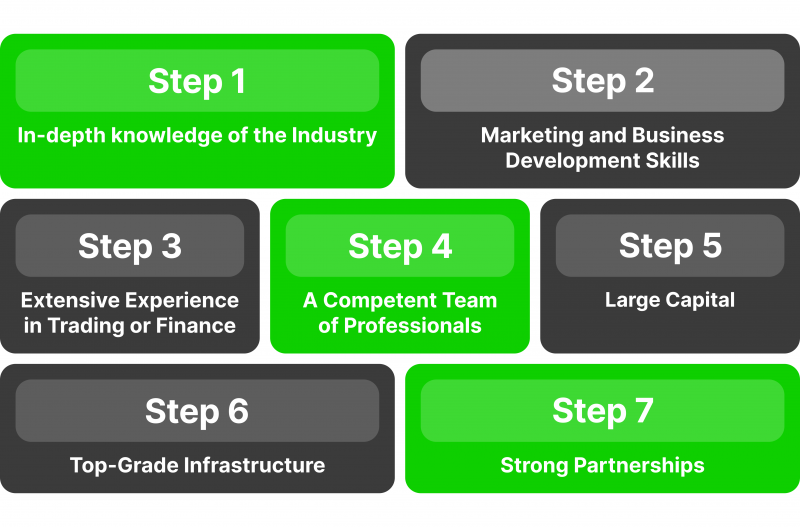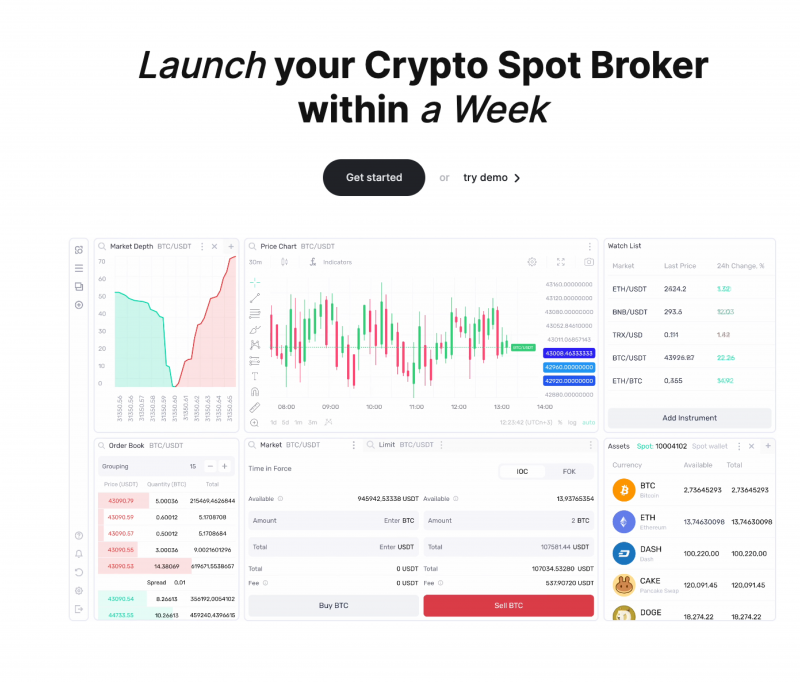How to Become a Crypto Broker in 2026: Detailed Guide

Entering the world of cryptocurrency in 2026 is a lucrative and unique opportunity, especially in light of recent developments in the crypto market. The significant upswing in Bitcoin’s value, notably influenced by the SEC’s approval of spot Bitcoin ETFs in January 2024, heightened retail interest in the sector.
Moreover, the long-awaited “Bitcoin halving,” a quadrennial event that reduces the reward for mining BTC, which happened on April 20th, 2024, is expected to further drive the price of the biggest crypto upwards over the medium and long term.
Given these market conditions, launching a crypto brokerage — a business model that merges the benefits of cryptocurrency exchanges with traditional brokerage operations — seems like a no-brainer for financial firms and aspiring entrepreneurs.
This article will focus on how to become a crypto broker in 2026, including step-by-step instructions and important considerations.
Key Takeaways
- Becoming a cryptocurrency broker can be achieved through building a standalone brokerage, using third-party white-label providers, or becoming an introducing broker.
- To build a crypto brokerage, you need experience, knowledge, resources, a professional team, a robust infrastructure, strong partnerships, and significant capital.
- Third-party white-label solutions can offer customisable trading platforms, back office tools, and compliance services to help you start a crypto brokerage.
Crypto Broker vs Exchange
First of all, what characterises a crypto broker and an exchange? Both these types of third parties facilitate buying, selling, and trading cryptocurrencies. However, they operate differently and cater to different target audiences. Crypto exchanges have been around since the early days of cryptocurrency trading, while crypto brokers are a relatively newer concept that has emerged in response to market demand.
Purpose:
The main purpose of a crypto exchange is to serve as an online marketplace where buyers and sellers can exchange coins and tokens with each other. Users can deposit cryptocurrency or fiat money to buy various cryptocurrencies at the desired price. The exchange charges a fee for this service, and once the transaction is complete, the user receives their purchased cryptocurrency.
On the other hand, what is a crypto broker? This financial services company acts as an intermediary between buyers and sellers. They work with multiple exchanges to find and aggregate the best prices for their clients. Brokers often offer additional services such as portfolio management and investment advice. They charge higher fees compared to exchanges but provide a more hands-on and personalised approach to trading.

However, the lines between crypto brokers and exchanges are becoming increasingly blurred today.
Sources of Revenue:
Both exchanges and brokers generate revenue through fees, but their sources of income differ. Exchanges make money by charging transaction fees, withdrawal fees, listing fees for new cryptocurrencies, and other service-related charges.
In contrast, brokers often have complex fee structures, including commissions on trades, spreads (the difference between the buy and sell price), overnight financing charges, and other miscellaneous fees.
How to Become a Cryptocurrency Broker
If you are interested in becoming a crypto broker-dealer, there are several ways to kickstart your brokerage. Let’s review the three main methods.
Building a Stand-Alone Brokerage From Scratch
The first option is to build your brokerage from the ground up. This approach allows for complete control over all aspects of the crypto business, from technology infrastructure and customer service to marketing and compliance.
However, setting up a stand-alone brokerage requires significant time, money, and expertise. You must develop or purchase a trading platform, establish relationships with liquidity providers and banks, and hire a team of professionals to manage all the operations.
Partnering with a Third-Party White Label Provider
Another option is to partner with a white-label provider. A WL solution allows you to use an existing trading platform and other necessary infrastructure under your brand while outsourcing back-office services such as compliance, risk management, and customer support.
Have a Question About Your Brokerage Setup?
Our team is here to guide you — whether you're starting out or expanding.
This method can be a more cost-effective and time-efficient way to start a brokerage. However, you may have less control over your business operations.
Becoming an Introducing Broker
The third option is to become an introducing broker (IB). As an IB, you would introduce clients to a larger brokerage firm in exchange for a commission. This approach requires minimal resources and expertise, as the leading brokerage would handle all back-office operations.
However, you may have limited control over your business and earn lower profits compared to running your own venue.

What Resources Are Needed to Build a Crypto Broker from Scratch?
A successful brokerage operation requires a specific skill set, experience, and resources, so not everyone can become a Bitcoin broker. Here are some qualifications that one must possess for running such a business:
- In-depth Knowledge of the Crypto Industry: The best crypto broker must have a comprehensive understanding of cryptocurrencies, including the underlying technology, market trends, and potential risks.
- Marketing and Business Development Skills: Brokers need excellent marketing skills to promote their services effectively and form strategic partnerships in the industry.
- Extensive Experience in Trading or Finance: Brokering involves handling trades worth large sums of money. Therefore, years of experience in trading are essential to developing expertise in your sphere.
- A Competent Team of Professionals: Creating a brokerage from scratch is not a one-person job; it requires a team of qualified professionals to maintain operations and manage the business. Your brokerage team will certainly include analysts, risk managers, and IT experts.
- Large Capital: Crypto companies offering trading services need significant capital to establish a strong market presence. These financial resources are required to establish the brokerage, cover operational costs, and maintain a stable trading platform.
- Top-Grade Infrastructure: With cybersecurity threats rising, crypto businesses must invest in robust and secure infrastructure to protect their clients’ assets. This includes advanced trading platforms, high-speed internet connections, and data encryption tools.
- Strong Partnerships: A successful company should establish relationships with reputable exchanges, liquidity providers, and payment gateways to facilitate trade execution.

Step-by-Step Guide to Building a Crypto Brokerage from Scratch
Here are the general steps you need to undertake to start your own brokerage from the ground up:
Step 1: Research the Market
The first step involves deep research on the current cryptocurrency market. Look into various cryptocurrencies, understand their technology and how they work, follow market trends, and be aware of the risks. Staying updated with the latest news and developments in the sector will allow you to run your company effectively.
Also, figure out who your target market is, what they prefer, and how they behave. Check out your competitors in your chosen area and find out what makes you different from them so that you can stand out and compete successfully.
Step 2: Assess Your Financials
Gather data on projected costs, such as office rent, employee salaries, technology infrastructure, and marketing expenses. Consult with industry experts and research industry benchmarks to ensure your financial projections are realistic, to identify potential risks and opportunities for your brokerage.
Defining financial details can assist you in determining the revenue you need to generate to cover your costs and achieve profitability. It also serves as a roadmap for budgeting, financial decision-making, and attracting investors or obtaining loans.
Step 3: Develop a Financial Plan
Create a comprehensive business plan that outlines your goals, target market, revenue streams, and marketing strategies. Determine your brokerage’s unique selling proposition and how you plan to differentiate yourself from competitors. Consider your services, such as OTC trading, margin trading, or access to exclusive investment opportunities.
To create a plan, you can refer to a template or seek the help of a financial advisor. A well-developed business plan will not only guide your decisions but also attract potential investors.
Step 4: Secure Funding
To start a brokerage, you need adequate funding to cover initial expenses and ensure smooth operations. Traditional sources of funding include angel investors, venture capitalists, and banks. However, these may not always be available or feasible options.
Consider alternative funding sources like crowdfunding platforms, peer-to-peer lending, or government grants for small businesses. These can provide access to capital without the strict requirements of traditional sources.
Step 5: Obtain Necessary Licenses and Register Your Firm
Before launching your brokerage, ensure you have all the licenses required by your jurisdiction. Regulatory authorities usually demand that you obtain a money transmitter license, register, and comply with anti-money laundering (AML) and know-your-customer (KYC) regulations.
One way to ensure full compliance is to engage legal counsel or partner with a law firm with expertise in the brokerage industry. They can ensure that all necessary requirements are met and assist in navigating any complexities or nuances in the application process.
Usually, you will need to gather all required documents and information for the brokerage or crypto exchange license and permit applications, which typically includes submitting detailed business plans, financial statements, background checks on key personnel, and proof of compliance with standards in the regulatory environment.
Moreover, you must pay any required fees to the appropriate regulatory bodies when submitting a crypto licensing application. To avoid processing delays, be sure to meet all specified deadlines and provide all requested documentation.
Different countries have different regulations for registering a crypto brokerage. China, India, Indonesia, and Turkey have outright banned cryptocurrencies, while countries like Estonia, Dubai, the Marshall Islands, and some others are preferred by crypto brokers due to softer regulations.
Step 6: Build a Team
A successful brokerage needs a team of professionals to handle various aspects of the business and ensure smooth operations. Hire analysts, risk managers, IT experts, and customer support staff. Each position should have specific qualifications and expertise. Do not forget to create a detailed job description.
To reach potential candidates, utilise various recruitment channels, such as online job portals, professional networks, and industry-specific platforms. Conduct thorough interviews and reference checks to assess their competence and fit with your firm’s culture. Additionally, consider providing comprehensive training programs to enhance your staff’s skills and knowledge in industry regulations, financial products, market trends, and customer relationship management.
Step 7: Form Strategic Partnerships
Partner with reputable exchanges and liquidity providers to offer competitive pricing and execution for your clients. Consider collaborating with technology providers to access advanced trading platforms and tools that can enhance your brokerage’s competitiveness in the market.
Step 8: Create Necessary Infrastructure
When it comes to setting up your electronic trading platform, you have a few options. You can either develop your own custom platform or choose from existing ones offered by third-party providers. Consider the features and functionality you require and compare different crypto broker software.
Some key components of a brokerage’s technological infrastructure may include:
Discover the Tools That Power 500+ Brokerages
Explore our complete ecosystem — from liquidity to CRM to trading infrastructure.
- A secure and encrypted website for clients to register and access their accounts
- Trading platforms with advanced features such as real-time market data, charting tools, and order execution
- Multi-level security measures, including two-factor authentication and cold storage for storing customer funds
- Integration with payment processors and other third-party services
- A dedicated CRM, back-office, and customer support system
Step 9: Market Your Brokerage
It’s time to start marketing your brokerage services and attracting customers. To do this, create a strong online presence through social media platforms, advertise on relevant websites or forums, and network with potential clients in the cryptocurrency community. You may also consider offering promotions or incentives.
Step 10: Launch Your Brokerage
Once all the necessary steps have been completed, it’s time to launch your brokerage officially. It is important to have a solid plan for managing operations and addressing any potential issues, like regularly reviewing and updating security measures.
Building a Brokerage with the Help of Third-Party Software
Building a brokerage from the ground up is a complex and time-consuming process. Moreover, you must allocate significant resources and expertise to ensure that your brokerage meets all necessary regulatory requirements and operates smoothly.
One way to simplify this process is by utilising third-party white-label solutions. These software providers offer customisable trading platforms, back office tools, compliance services, and other features to help you launch and manage your brokerage more efficiently.
Third-party software providers are well-versed in industry regulations and can ensure that your brokerage meets all requirements. They also offer ongoing technical support and updates to keep your platform up-to-date with the latest market developments.
B2BROKER is one such provider offering a range of solutions for building a cryptocurrency brokerage. Our offerings include white-label trading platforms (cTrader), liquidity and risk management tools, B2BINPAY crypto processing gateway, B2CORE CRM and back-office software, copy trading with B2COPY, KYC/AML compliance services, and more.
For cryptocurrency spot brokers, we offer a B2TRADER solution — which includes the infrastructure needed to launch brokerage within a week or integrate crypto spot trading into your existing operations.

Summary
Building a crypto spot brokerage is no easy feat: navigating through the regulatory framework, building a competent team, creating the necessary infrastructure, and marketing your services effectively. However, you can leverage third-party providers’ expertise to launch your brokerage effectively.
FAQ
How much does it cost to start a crypto brokerage?
The cost of starting a crypto brokerage can vary greatly depending on various factors such as location, business model, and crypto license. Generally, starting a crypto trading broker or exchange from scratch can range from $200,000 to $500,000, largely dependent on the project’s scope, development methods, and other specific factors.
At the same time, using a white-label solution can significantly reduce the initial costs, usually around $10,000 or more. Keep in mind that these are just rough estimates, and the final cost may differ depending on your specific business needs.
Is it possible to integrate crypto spot trading into my existing business operations?
Integrating third-party crypto spot trading into your business is relatively straightforward. You need to contact the provider of a preferred solution, who will help you with the integration process.
Do I need any specific crypto licenses to start a brokerage?
The requirements for operating a crypto brokerage vary depending on your location and the services you offer. Generally, you must obtain licenses for your brokerage from relevant regulatory bodies, such as the Securities and Exchange Commission (SEC) in the US or the Financial Conduct Authority (FCA) in the UK.
However, some jurisdictions do not require you to go through a licensing process to operate a crypto brokerage. However, having a crypto license can enhance your credibility as a financial company, which is crucial for building trust with your clients.








